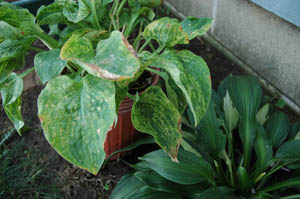Hosta Virus X Testing | |
|---|---|
| May 21, 2008 | |
|
Many gardeners now use hostas for color, texture, and design interest in shade gardens. In recent years, several viruses have become evident on this previously disease-free genus of plants. If you are buying new plants, moving hostas, sharing them with your friends, or on the receiving end, read this article first. Several hosta viruses have been reported in scientific literature in the past decade. These include hosta virus X (HVX), tomato ringspot virus, impatiens necrotic spot virus, and arabis mosaic virus. Hosta virus symptoms may be subtle or they may be obvious. The most common symptom is mottling of the leaves; but stunting, twisting, ring spots, and puckering may appear. There are many hosta cultivars on the market, and some have odd coloring, odd leaf form, and even some leaf puckering. Be familiar with the cultivar you are purchasing so that you can recognize abnormal symptoms. Plants do not have immune systems, so a virus stays with a plant for life. There are no chemicals that can be applied to rid the plant of the virus. If the hosta is very susceptible, it dies from the virus infection. More resistant plants may be mildly stunted or show symptoms without a growth response. The image shows a Plant Clinic sample infected with hosta virus X next to a healthy hosta.  The infected plant was confirmed by Agdia, Inc., a private lab in Indiana offers virus testing. You can visit them at www.agdia.com. Here is a Missouri Botanic Garden Web site with more pictures of hosta virus X–infected plants: http://www.mobot.org/gardeninghelp/plantfinder/IPM.asp?code=182&group=67&level=s Viruses cannot be cultured in a lab. They cannot be viewed with a compound microscope. Confirmation of a specific virus involves serological tests, usually ELISA, each for a specific virus. Tests are ordered based on symptoms. Crop screens can be done for groups of viruses at once. For example, Agdia has a tomato screen that tests for 17 viruses at once. The cost is considerably higher than testing for one virus, but it is more economical than ordering 17 individual tests. The University of Illinois Plant Clinic can test for a limited number of viruses. On hosta, we have the ability to test for hosta virus X and for impatiens necrotic spot virus. Samples submitted for virus testing must contain live, fresh foliage. It is best to call before sending a sample for virus testing, (217)333-0519. We want to be sure we have the testing materials and that you send us the correct sample. Meanwhile, know the qualities of the hosta cultivars you are planting, don’t try to save weak or odd-looking plants; and isolate suspect plants until they can be tested for virus. Because many viruses are spread in plant sap, always use good sanitation when moving between cultivars. | |
| Author: | Nancy Pataky |
